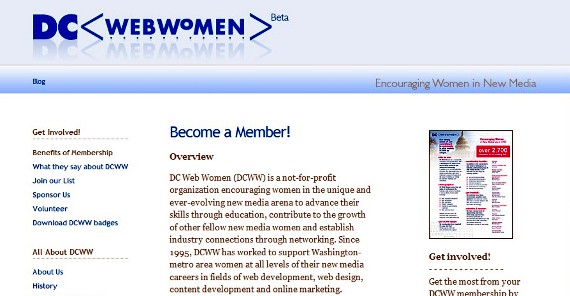Blog With Integrity hosted a free webinar on Nov. 10, 2009, featuring Federal Trade Commission (FTC) Associate Commissioner for Consumer Protection Mary Engle. The webinar discussed the new FTC guidance on disclosure and endorsements, which is critical information for bloggers who write about products and services plus the public relations and marketing people who hock them. You can view the Vimeo video below.
I have signed Blog with Integrity’s online pledge. I support clear disclosure of interests, treating others with respect, and taking responsibility for our words and actions. Right now, I am not taking any money for my blog posts and haven’t put any ads on my blog. If this changes in the future, the Blog with Integrity pledge will serve as my guidepost.
 The
The  I am a member of DC Web Women (DCWW), a 501(c)(6) professional organization of about 3000 members located in the Washington, D.C., area. Our members are professional women, students, and enthusiasts who specialize in the fields of web design, web development, computer science, Information Technology (IT), graphic design, web content, blogging, multimedia, marketing, e-marketing, Search Engine Optimization (SEO), web analytics, and social media.
I am a member of DC Web Women (DCWW), a 501(c)(6) professional organization of about 3000 members located in the Washington, D.C., area. Our members are professional women, students, and enthusiasts who specialize in the fields of web design, web development, computer science, Information Technology (IT), graphic design, web content, blogging, multimedia, marketing, e-marketing, Search Engine Optimization (SEO), web analytics, and social media. eVentures in Cyberland: Through the Web 2.0 Looking Glass, and What Communicators Found There was created using WordPress, a free open source content management system (CMS). A CMS is a software package that lets you build a website that non-technical people can quickly and easily (and therefore affordably) change and update. You could, for example, design a templates-based website like this one for as little as $1,000 (all in design, not writing, labor and assuming few rounds of design changes).
eVentures in Cyberland: Through the Web 2.0 Looking Glass, and What Communicators Found There was created using WordPress, a free open source content management system (CMS). A CMS is a software package that lets you build a website that non-technical people can quickly and easily (and therefore affordably) change and update. You could, for example, design a templates-based website like this one for as little as $1,000 (all in design, not writing, labor and assuming few rounds of design changes).